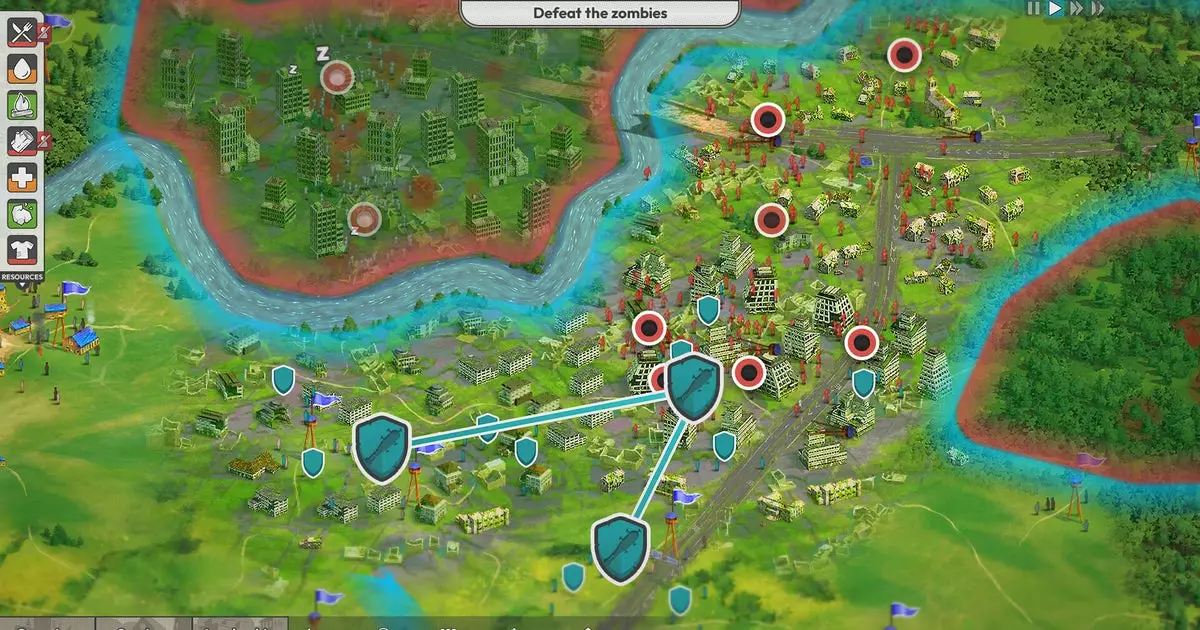The world of video games often serves as a canvas for exploring complex themes, from the mundane to the profound. One of the latest entrants into this landscape is Ndemic Creations’ After Inc: Revival, a post-apocalyptic city-building game where players are tasked with rebuilding society in the wake of a zombie apocalypse. Following the darkly comedic success of Plague Inc, this newer title presents a unique opportunity to examine human resilience and the nature of societal reconstruction after disaster. However, as we dive deep into this project, it’s essential to reflect on how its narrative aligns with contemporary issues surrounding the COVID-19 pandemic and our ongoing recovery.
After Inc: Revival transports players to a “beautiful post-apocalyptic United Kingdom,” where remnants of civilization lay scattered amid overgrown vegetation and lurking zombies. At first glance, the imagery is appealing, combining the quaint charm of cottages with hints of foreboding decay. Yet, this aesthetic might mask deeper commentary about our political and social landscapes. The juxtaposition of serene environments and the threat of zombie infestations offers a stark visual metaphor, suggesting that beauty often coexists with danger—a reflection that resonates with our present circumstances.
The game also invites players to scavenge the resources left in the wake of calamity, emphasizing a survivalist ethos that has become all too familiar. The choices players face—including whether children are a luxury or a necessity—echo ethical dilemmas encountered during public health crises. Through such decisions, After Inc challenges the player to contemplate the delicate balance of resource management and social welfare, a pressing issue for communities grappling with the fallout of today’s global crises.
One of the standout features in After Inc is the emphasis placed on decision-making—specifically, the shift between democratic and authoritarian governance. This invites players to reflect on the power dynamics at play in their societies while simultaneously holding a mirror to real-world governance structures. The game allows players to shape their settlements and communities while confronting moral predicaments that parallel today’s societal debates about individual freedom versus collective responsibility.
By intertwining political themes with gameplay, After Inc: Revival prompts players to reflect on their values and the implications of their choices. Are we prepared to sacrifice personal freedoms for the greater good, or do we prioritize individual rights even in the face of collective adversity? These are the kinds of questions that linger long after the console is turned off—making this title more than just a mere escape from reality.
The Art of Narrative: Lessons from the Pandemic
Perhaps the most complex layer of After Inc lies in its narrative structure, which aims to evoke a sense of realism grounded in contemporary fears. The developers have acknowledged their project as a B-movie fantasy while discreetly nudging at the shadows of real-life pandemics. By engaging with humor—albeit with the risk of being perceived as tactless—the game’s creators work to draw lines between fiction and reality.
This relationship becomes particularly vital considering today’s ongoing battle with COVID-19. The lighthearted banter about not fearing a zombie apocalypse touches upon the yearning for a “return to normal,” a phrase fraught with implications, given that we still navigate the repercussions of a global health crisis. Yes, the game can be seen as an entertaining distraction, but it also compels us to consider whether our view of normality might be overly simplistic given the challenges we face.
After Inc: Revival positions itself not only as an engaging gameplay experience but also as a medium for exploring deeper societal themes. Ndemic Creations has crafted a game that, while undoubtedly entertaining, prompts its players to confront the realities of rebuilding after destruction. As players forge new societies against a backdrop of zombies and political intrigue, they are encouraged to reflect on what it really means to recover from chaos—both in the virtual realm and in their lives outside of it. This multifaceted approach to storytelling and gameplay may just redefine how we perceive the role of video games in navigating our collective experiences of crisis and resilience.

